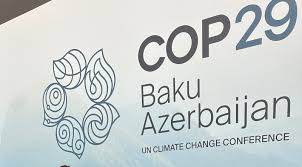After the usual pontifications at the latest climate change conference in Baku, Azerbaijan, Africa’s environmental gatekeepers and their international partnership are left providing a wish list about the future.
While developed countries still stratch their heads on balancing industry-driven profits and climate justice, the African Group of Negotiators and leaders at COP29 had set their sight on more money to help the continent deal with climate change.
They are asking for at least $1.3 million annually by 2030.
This should happen on the basis of equitable climate finance, stronger global partnerships, and urgent action to address the climate crisis on the continent which accounts for the least in global emissions.
The UN Economic Commission for Africa (ECA) in a statement from the Baku conference reminded the rest of the world particularly richer countries that the continent while being least responsible for global emissions, suffers some of the most severe impacts of climate change, losing an average of 5 percent of GDP annually to climate disruptions.
For the ECA equitable climate finance is the centerpiece of the strategy.
Instead of spending more healthcare and education, many African nations find themselves spending more on servicing debt yearly, a situation which the ECA and its partners say must change if the crusade against climate change will lead to any meaningful impact.
The Loss and Damage Fund, established at COP28, is a critical piece of this effort. Operationalising the fund would provide essential resources to countries already suffering from floods, droughts, and rising sea levels.
In several African countries including Senegal, Nigeria, Guinea, Niger, Chad, Cameroon and Ghana floods have resulted in serious homanitarian crises as millions of people are affected. Climate change watchers have blamed this inclement climate situation directly on the unabated emissions of greenhouse gases by industries in developed parts of the world where profit trumps the moral considerations about the environment.
Africa’s natural resources, particularly the Congo Basin, are a significant focus because it absorbs 1.5 billion tons of carbon annually and has sequestered 31 billion tons to date.
Currently, carbon credits from Africa sell for as little as $5 per ton in voluntary markets, compared to over $80 in regulated markets.
African leaders are advocating for a comprehensive framework to guide compliance markets, ensuring transparency and credibility in carbon trading.
It is hoped that by the next COP, significant strides would be made to save Africa and the rest of the underprivileged yet ravaged parts of the world from more climate crises.
MG/as/APA


